180
Words and expressions that have an interesting history of origin
Pass

This word, as well as the expression “Hey you, hat!”, has nothing to do with hats, soft-bodied intelligentsia and other standard images that arise in our heads. This word came into jargon straight from Yiddish and is a distorted form of the German verb schlafen - "sleep." And the “hat”, respectively, “sleeping, opening”. While you're hatting, your suitcase is draped.
Nonsense.
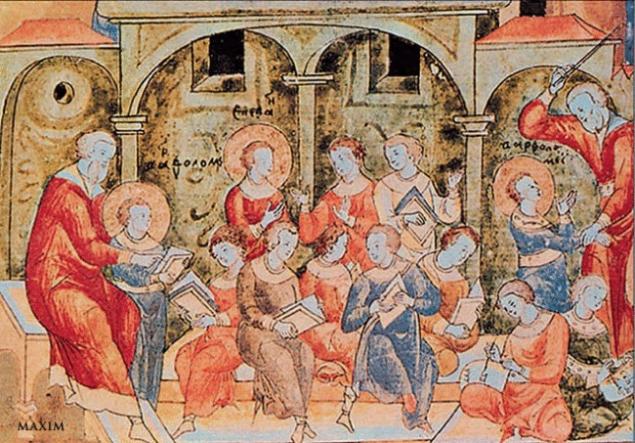
Seminarists who studied Latin grammar had serious scores for it. Take, for example, gerundy – this venerable member of the grammatical community, which in Russian simply does not exist. Gerundium is a cross between a noun and a verb, and the use of this form in Latin requires knowledge of so many rules and conditions that seminarians were often taken directly from classes to the infirmary with brain fever. In exchange, seminarians began to call any boring, tedious and completely indistinct nonsense “nonsense”.
Unfrightened idiot
Most people who suffer from congenital idiocy have the happy feature that it is quite difficult to scare them (as well as convince them to use a spoon and button their pants). It is painfully persistent they do not want to absorb any information from the outside. The expression went to walk with the light hand of Ilf and Petrov, who in their “Notebooks” enriched the world with the aphorism “The Edge of unafraid idiots”. It's time to be scared.” At the same time, writers simply parodied the name of Prishvin’s very popular book “In the Land of Unfrightened Birds”.
The Moor has done his job, the Moor can go.

For some reason, most people (even those who actually read Shakespeare) believe that these words belong to Othello, who strangled his Desdemon. In fact, the Shakespearean hero was anything but a cynic: he would rather strangle himself than smack such tactlessness over the corpse of his beloved. This phrase says another theatrical Moor - the hero of Schiller's play "The Conspiracy of Fiesco in Genoa". That Moor helped the conspirators gain power, and after the victory realized that yesterday's associates do not care about him from the high Genoese bell tower.
Throwing pearls before pigs
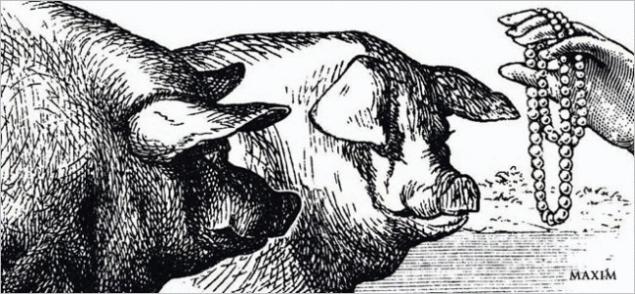
The process of throwing small glass crap before a pig is really perfect in its senselessness. But in the original text of the Bible, from where this phrase is scratched, there is no talk of any beads. It speaks of people who throw precious pearls into the feeder of pigs. Just once the words "pearl", "beads" and "pearls" meant exactly pearls, its different varieties. It was then that the industry began to stamp penny glass balls and called them the beautiful word “beads”.
With a twist.

The image of the highlight - a kind of small piquant detail that gives a feeling of sharpness and unusualness - gave us personally Leo Tolstoy. It was he who first introduced the expression “woman with a twist”. In his drama The Living Corpse, one character tells another: My wife the perfect woman was... But what can I tell you? There was no zest, you know, in kvass the zest? - there was no game in our lives.
China's latest warning
If you were born before 1960, you remember the origin of the expression, because you never forget it. But subsequent generations were already deprived of the happiness of watching the confrontation between the United States and China at the turn of the 50-60s of the XX century. When China, angered by U.S. air and naval support for Taiwan, issued its angry note in 1958, titled “The Last Warning,” the world shuddered with horror and held its breath in anticipation of World War III. When China issued the four-hundredth note under the same name seven years later, the world howled with delight. Since China had nothing to oppose the United States, Taiwan retained its independence, which Beijing has not yet recognized.
How to drink
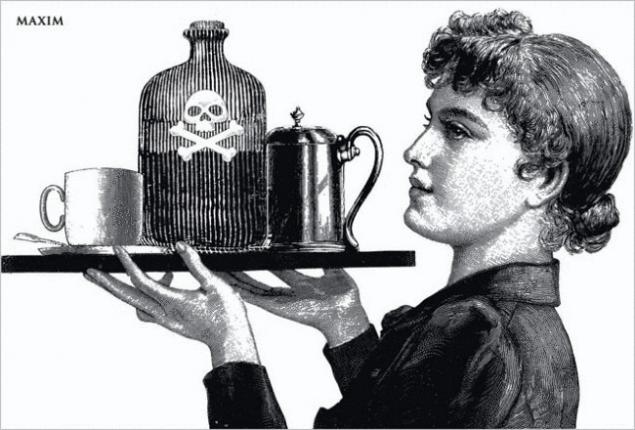
It would not be very clear how the process of drinking is associated with the concepts of “certainly” and “guaranteed”, if there were no lists of criminal jargon of the XVIII-XIX centuries, in which the expression “give drink” is synonymous with the word “poison”. For poisoning is really one of the safest and safest ways for a murderer to get rid of an intruder.
Not one iota.
Iota is the letter of the Greek alphabet for sound [and]. It was depicted in the form of a tiny dash, and often lazy scribes just threw it out of the text, as without iota it was always possible to understand what it was about. We don't dot the "e," do we? The author of the phrase is Jesus Christ, who promised the Jews that the Law would not change “one iota,” that is, even the most insignificant changes would be excluded.
The case smells like kerosene.

Yes, we, too, at first thought that these words are a common phrase from the vocabulary of a firefighter who, inspecting the charred ruins, puts forward a version of deliberate arson. Well, nothing like that! The aphorism has a very specific author – the famous journalist Mikhail Koltsov, who published in 1924 in “Pravda” the feuilleton “Everything is OK”. In the feuilleton, the mores of American oil magnates are flaming, handing out “kerosene-smelling” bribes back and forth.
Alive, smoker!
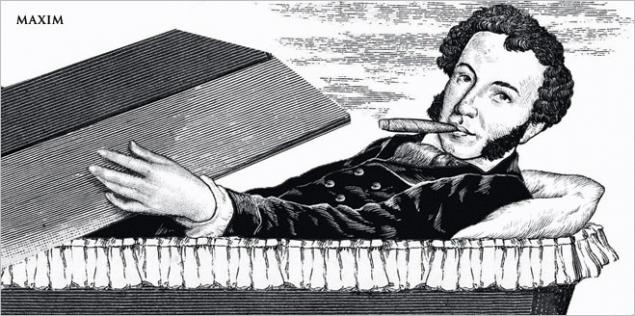
The famous expression, which everyone knows belongs to the poet Pushkin, in fact does not belong to Pushkin. This is a sentence from a once popular children's game. The children, standing in a circle, quickly passed each other a burning ray and sang: “Live, the smoker is alive!” Still a smoker alive! The same unfortunate man in whose hands the smoker went out, was considered a loser and had to perform some stupid, and sometimes unsafe task - for example, to sprinkle nasty Amalia Yakovlevna snuff in the night cap.
A grand piano in the bushes
But this phrase is actually author's. It is taken from the famous sketch by Gorin and Arkanov “Perfectly by accident”. In this scene, humorists depicted the principles of reporting on Soviet television. “Let us go to the first bystander. This is a pensioner, Seregin, a labor drummer. In his free time he likes to play the piano. And just in the bushes accidentally stands a piano, on which Stepan Vasilyevich will play us Polonaise Oginsky.
Passion-face.
Slovechko became popular thanks to Gorky, who called one of his stories so. But Gorky, who was not distinguished by his ability to verbal delights, did not come up with it himself, but stole it from an optimistic folk lullaby, which entirely sounds like this:
Passion-faces will come,
They'll bring Napaza with them.
They'll bring Naplash.
They'll tear your heart apart!
Oh, trouble! Oh, trouble!
Where do we hide, where?
So if Good Night, Kids! finally decides to change their song, we have something to offer them.
Dance from the stove
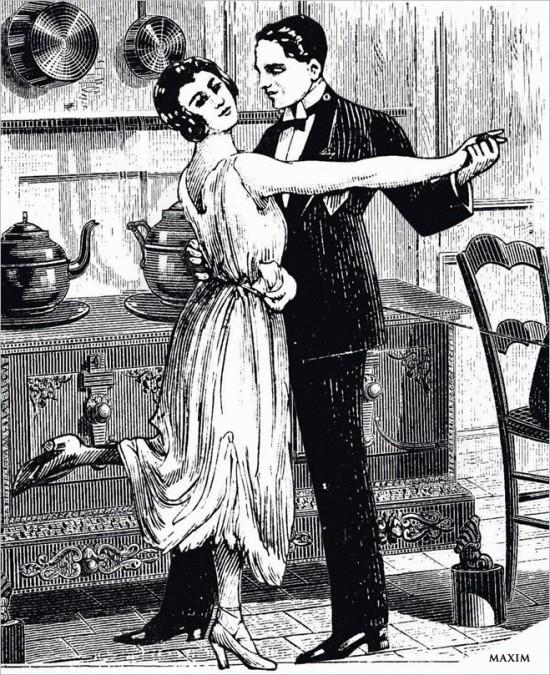
And here we have a slightly sad, but instructive example of how almost nothing remains of the whole writer. Does the name Vasily Sleptsov tell you anything? Don't worry, you're not the only one. Today, Sleptsov is known only by erudite specialists in Russian literature. He was simply unlucky: he was born and lived simultaneously with Tolstoy, Dostoevsky and other Turgenevs. Here are three words left from Sleptsov in the memory of the people. In the novel “The Good Man”, the hero recalls how in childhood he was tortured by dancing lessons – put to the stove and forced to walk a dance step through the hall. And he's going to squirm, then he's going to turn his sock, and he's going to be driven to dance from the stove again.
Filkina's diploma

Unlike Trishka with a Kaftan or Kuzki with his mysterious mother, Filka is quite a historical person. This is the head of the Russian Orthodox Church, Metropolitan Philip II of Moscow. He was a short-sighted man, forgetting that the first duty of the Moscow high priest was to give Caesar a Caesar, so he scorched his trouble with the tsar-father Ivan the Terrible. I thought, you know, to expose the bloody atrocities of the tsarist regime – I began to write true stories about how many people the tsar tortured, tortured, burned and poisoned. The tsar called the Metropolitan writing “Filkin’s Letter”, feared that Filka was lying, and imprisoned Filka in a distant monastery, where the metropolitan was almost immediately killed by the assassins sent.
Quiet boot
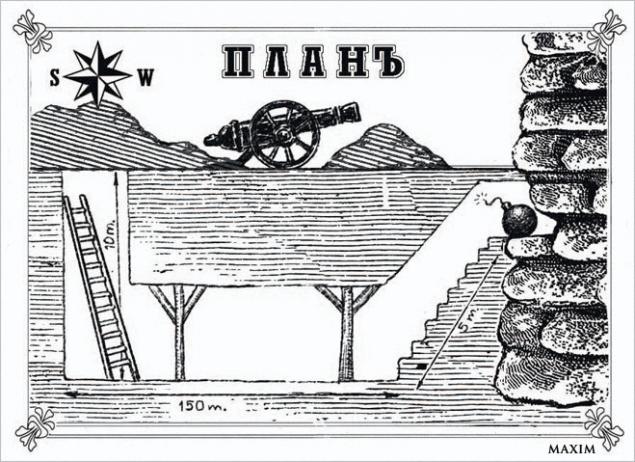
Sapa is a term borrowed from the French, denoting in the Russian army a mine, a bomb, as well as any explosive work. A quiet boot was called a dig under the walls of a besieged city or the fortification of an enemy camp. Such a dig sappers conducted quietly, usually at night, so that the subsequent loud boom was for the enemy a complete surprise.
bohemia
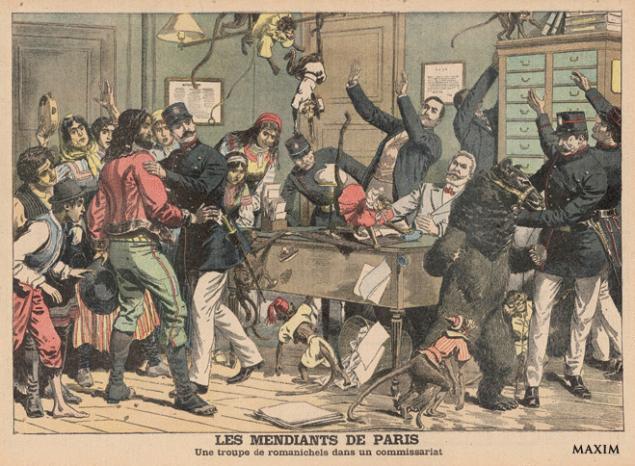
Creative intelligentsia, beautiful life, glamour and other buffets - all this has nothing to do with the bohemian. The real bohemia that Parisians meant when they used this word was the lack of housing and work, a bunch of children, a drunken wife in an embrace with guests, no regime, rubbish everywhere, mess, lawlessness and dirty nails. Because the word "Bohemian" means "Gypsy", and in Russian "Bohemian" perfectly accurately translates as "Gypsy".
nerd
Words sometimes jump from meaning to meaning, like lions on the booths of a trainer, and sit in the most unexpected combinations. For example, there was a doctor in France named Chrétien, which means “Christian.” Not that a common, but not too rare surname (we have a whole estate of peasants, that is, Christians, called). But it was this doctor who managed to formulate the diagnosis of congenital thyroid insufficiency syndrome for the first time. From now on, this disease began to be called by the name of the scientist “cretinism”, and patients, respectively, cretins. I mean, Christians.
Suffering shit.
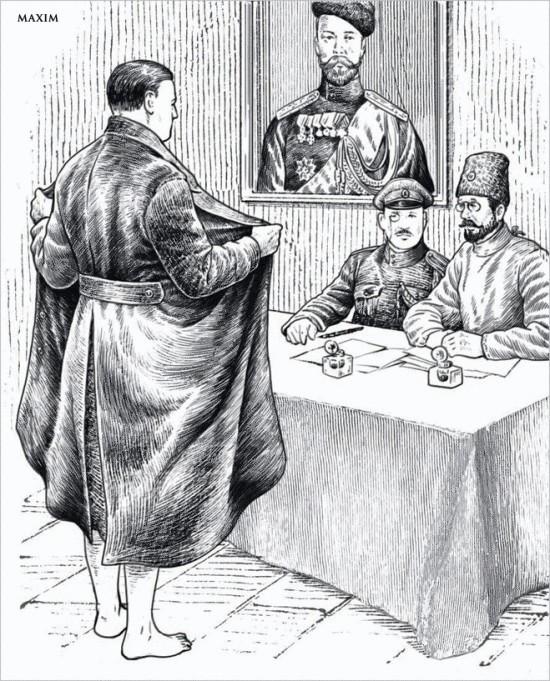
Perhaps we will get in trouble because we wrote such obscenities in our pious publication. Although, if you look at it, there is nothing indecent about the word "shit." This was the name of the letter “x” in the Church Slavonic alphabet, as well as any cross in the form of the letter “x”. When the cross crossed out unnecessary places in the text, it was called "fuck." The old alphabet with all the basics and beacons was finally abolished at the beginning of the XX century, and the word “shit”, having gone out of use, after half a century became synonymous with a short word on “x” (you know what). And at the same time, it began to seem obscene and a common expression with a similar root - "suffer shit." Hernia in Latin means “hernia”, and it was this diagnosis that good military doctors most often exposed to children of wealthy philistines who did not want to serve in the army. Every fifth citizen-conscript in Russia at the end of the XIX century regularly suffered from crap (peasants the same bullshit was often not affordable, and they shaved much more actively).
Places not so remote
In the 1845 Penalty Code, references were divided into “remote” and “not so distant.” By "remote" meant the Siberian provinces and later Sakhalin, by "not so distant" - Karelia, Vologda, Arkhangelsk regions and some other places located just a few days away from St. Petersburg.
Source: muz4in.net
Source: /users/1077

This word, as well as the expression “Hey you, hat!”, has nothing to do with hats, soft-bodied intelligentsia and other standard images that arise in our heads. This word came into jargon straight from Yiddish and is a distorted form of the German verb schlafen - "sleep." And the “hat”, respectively, “sleeping, opening”. While you're hatting, your suitcase is draped.
Nonsense.

Seminarists who studied Latin grammar had serious scores for it. Take, for example, gerundy – this venerable member of the grammatical community, which in Russian simply does not exist. Gerundium is a cross between a noun and a verb, and the use of this form in Latin requires knowledge of so many rules and conditions that seminarians were often taken directly from classes to the infirmary with brain fever. In exchange, seminarians began to call any boring, tedious and completely indistinct nonsense “nonsense”.
Unfrightened idiot
Most people who suffer from congenital idiocy have the happy feature that it is quite difficult to scare them (as well as convince them to use a spoon and button their pants). It is painfully persistent they do not want to absorb any information from the outside. The expression went to walk with the light hand of Ilf and Petrov, who in their “Notebooks” enriched the world with the aphorism “The Edge of unafraid idiots”. It's time to be scared.” At the same time, writers simply parodied the name of Prishvin’s very popular book “In the Land of Unfrightened Birds”.
The Moor has done his job, the Moor can go.

For some reason, most people (even those who actually read Shakespeare) believe that these words belong to Othello, who strangled his Desdemon. In fact, the Shakespearean hero was anything but a cynic: he would rather strangle himself than smack such tactlessness over the corpse of his beloved. This phrase says another theatrical Moor - the hero of Schiller's play "The Conspiracy of Fiesco in Genoa". That Moor helped the conspirators gain power, and after the victory realized that yesterday's associates do not care about him from the high Genoese bell tower.
Throwing pearls before pigs

The process of throwing small glass crap before a pig is really perfect in its senselessness. But in the original text of the Bible, from where this phrase is scratched, there is no talk of any beads. It speaks of people who throw precious pearls into the feeder of pigs. Just once the words "pearl", "beads" and "pearls" meant exactly pearls, its different varieties. It was then that the industry began to stamp penny glass balls and called them the beautiful word “beads”.
With a twist.

The image of the highlight - a kind of small piquant detail that gives a feeling of sharpness and unusualness - gave us personally Leo Tolstoy. It was he who first introduced the expression “woman with a twist”. In his drama The Living Corpse, one character tells another: My wife the perfect woman was... But what can I tell you? There was no zest, you know, in kvass the zest? - there was no game in our lives.
China's latest warning
If you were born before 1960, you remember the origin of the expression, because you never forget it. But subsequent generations were already deprived of the happiness of watching the confrontation between the United States and China at the turn of the 50-60s of the XX century. When China, angered by U.S. air and naval support for Taiwan, issued its angry note in 1958, titled “The Last Warning,” the world shuddered with horror and held its breath in anticipation of World War III. When China issued the four-hundredth note under the same name seven years later, the world howled with delight. Since China had nothing to oppose the United States, Taiwan retained its independence, which Beijing has not yet recognized.
How to drink

It would not be very clear how the process of drinking is associated with the concepts of “certainly” and “guaranteed”, if there were no lists of criminal jargon of the XVIII-XIX centuries, in which the expression “give drink” is synonymous with the word “poison”. For poisoning is really one of the safest and safest ways for a murderer to get rid of an intruder.
Not one iota.
Iota is the letter of the Greek alphabet for sound [and]. It was depicted in the form of a tiny dash, and often lazy scribes just threw it out of the text, as without iota it was always possible to understand what it was about. We don't dot the "e," do we? The author of the phrase is Jesus Christ, who promised the Jews that the Law would not change “one iota,” that is, even the most insignificant changes would be excluded.
The case smells like kerosene.

Yes, we, too, at first thought that these words are a common phrase from the vocabulary of a firefighter who, inspecting the charred ruins, puts forward a version of deliberate arson. Well, nothing like that! The aphorism has a very specific author – the famous journalist Mikhail Koltsov, who published in 1924 in “Pravda” the feuilleton “Everything is OK”. In the feuilleton, the mores of American oil magnates are flaming, handing out “kerosene-smelling” bribes back and forth.
Alive, smoker!

The famous expression, which everyone knows belongs to the poet Pushkin, in fact does not belong to Pushkin. This is a sentence from a once popular children's game. The children, standing in a circle, quickly passed each other a burning ray and sang: “Live, the smoker is alive!” Still a smoker alive! The same unfortunate man in whose hands the smoker went out, was considered a loser and had to perform some stupid, and sometimes unsafe task - for example, to sprinkle nasty Amalia Yakovlevna snuff in the night cap.
A grand piano in the bushes
But this phrase is actually author's. It is taken from the famous sketch by Gorin and Arkanov “Perfectly by accident”. In this scene, humorists depicted the principles of reporting on Soviet television. “Let us go to the first bystander. This is a pensioner, Seregin, a labor drummer. In his free time he likes to play the piano. And just in the bushes accidentally stands a piano, on which Stepan Vasilyevich will play us Polonaise Oginsky.
Passion-face.
Slovechko became popular thanks to Gorky, who called one of his stories so. But Gorky, who was not distinguished by his ability to verbal delights, did not come up with it himself, but stole it from an optimistic folk lullaby, which entirely sounds like this:
Passion-faces will come,
They'll bring Napaza with them.
They'll bring Naplash.
They'll tear your heart apart!
Oh, trouble! Oh, trouble!
Where do we hide, where?
So if Good Night, Kids! finally decides to change their song, we have something to offer them.
Dance from the stove

And here we have a slightly sad, but instructive example of how almost nothing remains of the whole writer. Does the name Vasily Sleptsov tell you anything? Don't worry, you're not the only one. Today, Sleptsov is known only by erudite specialists in Russian literature. He was simply unlucky: he was born and lived simultaneously with Tolstoy, Dostoevsky and other Turgenevs. Here are three words left from Sleptsov in the memory of the people. In the novel “The Good Man”, the hero recalls how in childhood he was tortured by dancing lessons – put to the stove and forced to walk a dance step through the hall. And he's going to squirm, then he's going to turn his sock, and he's going to be driven to dance from the stove again.
Filkina's diploma

Unlike Trishka with a Kaftan or Kuzki with his mysterious mother, Filka is quite a historical person. This is the head of the Russian Orthodox Church, Metropolitan Philip II of Moscow. He was a short-sighted man, forgetting that the first duty of the Moscow high priest was to give Caesar a Caesar, so he scorched his trouble with the tsar-father Ivan the Terrible. I thought, you know, to expose the bloody atrocities of the tsarist regime – I began to write true stories about how many people the tsar tortured, tortured, burned and poisoned. The tsar called the Metropolitan writing “Filkin’s Letter”, feared that Filka was lying, and imprisoned Filka in a distant monastery, where the metropolitan was almost immediately killed by the assassins sent.
Quiet boot

Sapa is a term borrowed from the French, denoting in the Russian army a mine, a bomb, as well as any explosive work. A quiet boot was called a dig under the walls of a besieged city or the fortification of an enemy camp. Such a dig sappers conducted quietly, usually at night, so that the subsequent loud boom was for the enemy a complete surprise.
bohemia

Creative intelligentsia, beautiful life, glamour and other buffets - all this has nothing to do with the bohemian. The real bohemia that Parisians meant when they used this word was the lack of housing and work, a bunch of children, a drunken wife in an embrace with guests, no regime, rubbish everywhere, mess, lawlessness and dirty nails. Because the word "Bohemian" means "Gypsy", and in Russian "Bohemian" perfectly accurately translates as "Gypsy".
nerd
Words sometimes jump from meaning to meaning, like lions on the booths of a trainer, and sit in the most unexpected combinations. For example, there was a doctor in France named Chrétien, which means “Christian.” Not that a common, but not too rare surname (we have a whole estate of peasants, that is, Christians, called). But it was this doctor who managed to formulate the diagnosis of congenital thyroid insufficiency syndrome for the first time. From now on, this disease began to be called by the name of the scientist “cretinism”, and patients, respectively, cretins. I mean, Christians.
Suffering shit.

Perhaps we will get in trouble because we wrote such obscenities in our pious publication. Although, if you look at it, there is nothing indecent about the word "shit." This was the name of the letter “x” in the Church Slavonic alphabet, as well as any cross in the form of the letter “x”. When the cross crossed out unnecessary places in the text, it was called "fuck." The old alphabet with all the basics and beacons was finally abolished at the beginning of the XX century, and the word “shit”, having gone out of use, after half a century became synonymous with a short word on “x” (you know what). And at the same time, it began to seem obscene and a common expression with a similar root - "suffer shit." Hernia in Latin means “hernia”, and it was this diagnosis that good military doctors most often exposed to children of wealthy philistines who did not want to serve in the army. Every fifth citizen-conscript in Russia at the end of the XIX century regularly suffered from crap (peasants the same bullshit was often not affordable, and they shaved much more actively).
Places not so remote
In the 1845 Penalty Code, references were divided into “remote” and “not so distant.” By "remote" meant the Siberian provinces and later Sakhalin, by "not so distant" - Karelia, Vologda, Arkhangelsk regions and some other places located just a few days away from St. Petersburg.
Source: muz4in.net
Source: /users/1077
Jobs from children's books, which stand on end the hair of both children and parents
Five of the most anticipated breakthroughs in science and technology























